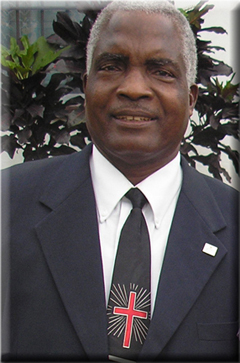Liberian Corruption: Behold The Well Overflows
By Rev. John S. M. Russell
The Perspective
Atlanta, Georgia
1996
Reposted: June 27, 2019
 |
|---|
The Late Rev Dr. John S. M. Russell |
Editor's Note:The late Rev Dr. Joihn S. M. Russell is going home on June 29, 2019, after several years of serving the United Methodist Chuch and the people of Liberia. At The Perspective, the premier site and authoritative resource for news and analysis on Liberia, we remember Rev. Dr. Russell for, among other things, his wisdom and advice about corruption, given to the Liberian people through the August-October, 1996, Edition of The Perspective.
Once upon a time, there was a family that lived in the remotest part of Maryland County, Liberia which is located on the west coast of Africa. The couple had five sons between the ages of six months and ten years.
While they were eating one evening, a bat flew into their thatched hut, dropping dirt in their food as it kept flying around in the residence. Understandably, the father became angry and decided to kill the bat. He grabbed the mortar pestle and threw it at the roving bat with all his strength. But he missed his target. Instead, the mortar pestle hit his six month-old baby on the forehead, killing the child instantly. When he saw his dead baby, he became angry even more and resolved not to let the beast escape death. So he started chasing it in the hut, wasting the food they were eating in the process.
Once again he threw the pestle at the bat for the second time, he missed again and hit another son on the neck. This child also died of his injury. The father threw the pestle for the third time but missed and hit a third son, killing that one , and the fourth child in like manner. When he was about to throw the stick for the fifth time, his grief-stricken wife grabbed it from him and said, "My husband, if you don't stop fighting this bat you will kill our last and only son." While he and his wife were tossing over the pestle, the bat flew out into the dark from whence it came. Finally, when everything settled down, the family was left with four dead children to bury and no food to eat.
This tale is analogous to the current Liberian situation. Like the featured bat, corruption entered the Liberian political system in the dark hours of politics. Every body in and out of the country was crying against social injustice. Many felt they were being marginalized and deprived of the benefit of their fathers' land. But no one dare cry out too loud enough to be heard. Apathy became the game of the day.
Consequently, there was very little honesty in the administration of both public and private affairs. Corruption became so rampant until anyone who attempted to stop evil doings became victim of crime. When the brave ones among us tried to raise their voices. their parents and other relatives, as well as the complacent majority, would advise: "Leave the people's thing. Don't talk. You are not the only one suffering."
This impassive attitude continued until April 1980 when the army decided to kill the corruption with their M-16s. When the world community heard the sound of guns and the cries of women and children, they inquired: "What is happening in Liberia?" The military replied, sarcastically. " We are killing the rampant corruption that had entered our society from the dark."
But six months later, corruption resurfaced in the Executive Mansion, on Capitol Hill and in the rank and file of the military. This pervasive creature overwhelmed the entire country, finding its way in every facet of society and corruption once again became the norm rather than the exception in Liberia. By January 1989, corruption had taken over every sphere of Liberian life. No aspect of the social fabric was left untouched by it.
So, Charles Taylor and his so-called National Patriotic Front of Liberia (NPFL) got very angry and vowed to kill the entire generation of corruption - the parents, children, and grandchildren. As a result, on December 24,1989, the NPFL launched its deadly attack on corruption, starting from the peak of the Nimba Range. With vengeance as Mr. Taylor's guide, his blood thirsty forces went into every corner of the country where they thought corruption would be hiding some of its children. They and their counterpart militias killed, maimed and terrorized the citizens and destroyed the infrastructure of Liberia.
Skeptical of his effort to eliminate corruption thus far, Mr. Taylor decided to confront this menace at its base. So on April 6, 1996, his forces entered Monrovia and started sweeping the city with the determination to capture and destroy the last haven of corruption. But when the dust finally settled down, everybody was surprised to hear the whole generation of corruption at Ducor Palace Hotel and elsewhere celebrating its victory for not losing a single member in the fight, and waiting for the next Council of State to begin its proliferation anew.
Fellow Liberians, you have heard the story. My question is, now that we are moving toward May 1997, when elections are to be held in Liberia, who among us is prepared to kill corruption without killing the victims of corruption and Liberia's children again?
Let me therefore leave you with the admonition which God the Almighty gave one of the Kings of Israel who wanted to rebuild the Temple in Jerusalem: '"Not by might, not by power, but by my spirit, saith the Lord" (Zechariah 4:6).
Reverend John S. M. Russell is a Liberian lecturer at African University in Mutare, Zimbabwe and Former President of the College of West Africa